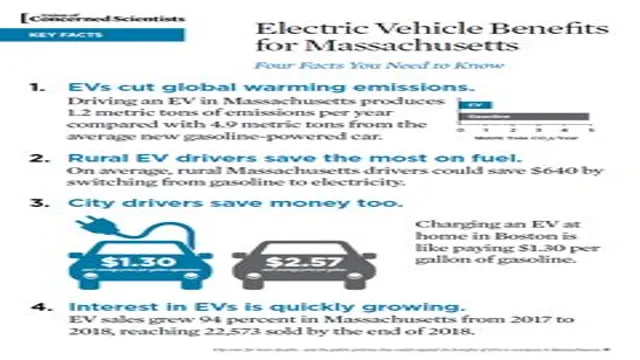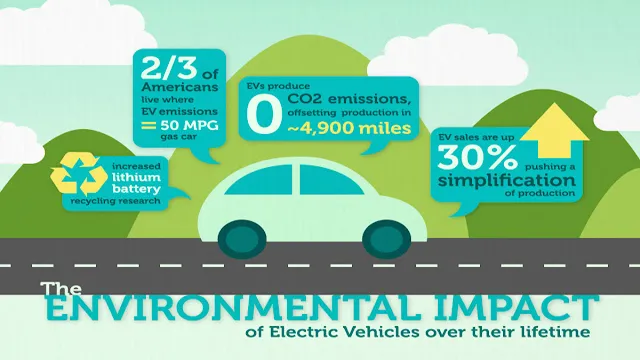Charging towards a Greener Future: The Incredible Environmental Benefits of Electric Cars
When it comes to reducing environmental impact, electric cars have become a hot topic in recent years. With the world becoming increasingly aware of the harmful effects of traditional gas-powered vehicles, more and more people are looking to electric alternatives. But what is it about electric cars that make them better for the environment? Are they really the solution we have been looking for? In this blog, we will explore the relationship between electric cars and the environment, diving into the science behind it all and dispelling myths along the way.
So buckle up, grab your charger and let’s explore the impact of electric cars on our planet.
Reduced Greenhouse Gas Emissions
Electric cars bring a variety of benefits to the environment, and one of the most significant is the reduction of greenhouse gas emissions. By running on electricity, these cars emit no direct carbon emissions, making them a cleaner alternative to gas-powered vehicles. Even when factoring in the emissions generated by the production and transportation of electricity needed to charge electric car batteries, these emissions are still significantly lower than the emissions produced by traditional cars.
This reduction in emissions helps to combat global warming and climate change, playing a key role in building a more sustainable future. By opting for an electric car, individuals can make a tangible difference in reducing their carbon footprint and improving the health of our planet.
Battery electric cars emit 50-100% less greenhouse gases than gas-powered ones.
Battery electric cars have been deemed as a more eco-friendly alternative compared to their gas-powered counterparts. When it comes to greenhouse gas emissions, studies show that battery electric cars result in 50-100% fewer emissions than conventional cars. This is because the primary source of energy for battery electric cars is electricity produced from renewable sources such as solar, wind, or hydropower.
Moreover, the energy required to produce and maintain electric cars also accounts for fewer emissions. In contrast, gas-powered cars emit a considerable amount of carbon dioxide and other harmful pollutants. By switching to battery electric cars, we can significantly reduce our carbon footprint, contributing to a cleaner and more sustainable environment.

Electricity generation accounts for lower emissions than oil refining.
Electricity generation is undoubtedly a critical part of our modern lives, not just for powering our homes but also for reducing greenhouse gas emissions. Compared to oil refining, electricity generation accounts for lower emissions as it relies on a mix of renewable and non-renewable energy sources such as wind, solar, hydro, nuclear, and natural gas. While oil refining emits a considerable amount of greenhouse gases, including carbon dioxide, electricity generation produces far less carbon emissions.
By investing in cleaner energy sources, we can significantly reduce greenhouse gas emissions and mitigate climate change’s devastating effects. It’s crucial to understand that our energy choices have a substantial impact on the planet, and by opting for cleaner energy sources, we can ensure a healthier, more sustainable future for generations to come.
Less Air Pollution
Electric cars have many benefits for the environment, including reducing air pollution. One of the biggest contributors to air pollution is the exhaust fumes from traditional gasoline-powered vehicles. Electric cars do not produce any emissions, making them a much cleaner option.
This is not only good news for humans but also for the planet. Air pollution can have a devastating impact on wildlife and their habitats. By reducing the amount of air pollution, we are helping to improve the health of the world around us.
Electric cars are also quieter than traditional vehicles, reducing noise pollution. While they may require electricity to run, if the electricity we use to power them comes from renewable sources such as wind or solar, the environmental benefits are even greater. Switching to electric cars can have a huge impact on reducing our carbon footprint and help create a cleaner, healthier planet for generations to come.
Zero tailpipe emissions decreases smog & health risks.
Zero tailpipe emissions are a crucial factor in decreasing air pollution and reducing health risks associated with smog. With the increase in the use of vehicles, there has also been a rise in harmful pollutants like carbon monoxide, nitrogen oxides, and particulate matter, which pose serious health hazards, especially for those living in highly populated areas. However, with the rise of electric vehicles, we have hope for a cleaner environment and better health conditions.
Zero tailpipe emissions from electric cars, buses, and bikes make it possible to reduce air pollution significantly, which can ultimately improve respiratory health and reduce the risk of lung cancer and heart disease. In fact, if more people switch to electric vehicles and adopt sustainable practices, we can significantly improve air quality and take a step towards building a healthier and safer future for ourselves and generations to come. So, let’s embrace the power of zero tailpipe emissions and work towards building a cleaner, greener, and more sustainable future!
Electric engines are more eco-friendly & easier to control than traditional engines.
Electric engines are becoming popular, mainly because they are more eco-friendly and easier to control than traditional engines. One of the most significant benefits of electric engines is that they produce less air pollution than gasoline-powered engines. Unlike traditional vehicles, which emit hazardous gases like carbon monoxide, nitrogen oxides, and particulate matter, electric engines operate quietly and do not produce emissions.
With electric engines, drivers can help reduce air pollution and make their communities cleaner and safer for everyone. Moreover, electric engines offer better control than traditional engines. Due to their simpler design and easy-to-use features, electric engines can provide a smoother driving experience with reduced noise and vibration.
Additionally, these engines respond quickly to a driver’s commands, which leads to better handling and less time for the vehicle to accelerate. In summary, electric engines provide both environmental and performance benefits compared to traditional engines. By adopting electric engines, we can reduce our carbon footprint and create cleaner, quieter, and more efficient communities in the future.
Sustainable Energy Use
Electric cars are a promising step towards sustainability and a greener future. They have a significant advantage over traditional internal combustion engines in terms of their impact on the environment. Unlike gasoline-powered cars, electric vehicles produce zero emissions, which means they do not release harmful pollutants into the atmosphere.
Electric cars have the potential to reduce the levels of carbon emissions that contribute to global warming. Additionally, electric cars offer benefits beyond just reducing greenhouse gas emissions. They tend to have lower operating and maintenance costs compared to gasoline-powered vehicles and charge at a fraction of the cost of refilling a tank.
The use of electric cars not only reduces our environmental impact but can also lead to significant financial savings for individuals and businesses. In conclusion, the benefits of electric cars for the environment are substantial, and their popularity is only expected to grow as technology advances and charging infrastructure expands.
Electric cars are powered by the electrical grid, which can be charged by renewable energy sources.
Electric cars have become a popular alternative to traditional gasoline vehicles, and for good reason. One of the biggest benefits of electric cars is their sustainable energy use. These vehicles rely on the electrical grid to charge their batteries, which can be powered by renewable energy sources such as solar or wind power.
This means that electric cars can help reduce greenhouse gas emissions and improve air quality, making them a more environmentally friendly option. In addition to being better for the planet, electric cars can also save drivers money on fuel costs in the long run compared to traditional gasoline vehicles. While there are still some hurdles to overcome in terms of infrastructure and battery technology, the growth of electric cars in recent years is a promising sign for the future of sustainable transportation.
Promotes the use of sustainable energy to power transportation
As the world faces issues with climate change and its impact on our environment, there is an urgent need to switch to sustainable energy to power transportation. Sustainable energy encompasses various sources such as wind, solar, and hydropower, which are renewable and have a low carbon footprint. The use of sustainable energy in transportation is crucial as it can significantly reduce greenhouse gas emissions.
For instance, electric vehicles that run on renewable energy emit far fewer emissions compared to gasoline-fueled vehicles, which are responsible for a substantial portion of carbon emissions. Additionally, the use of sustainable energy could help reduce our dependence on fossil fuels, which are finite and non-renewable resources. Adopting sustainable energy for transportation also has the potential to create jobs and boost economic growth.
In conclusion, promoting the use of sustainable energy to power transportation is a crucial step towards environmental sustainability and should be encouraged at all levels.
Efficient Energy Use
Electric cars are becoming increasingly popular due to their many benefits for the environment. They are extremely energy efficient because they run on electricity instead of gasoline, meaning they emit significantly less harmful pollutants into the air. This reduction in pollution has a positive impact on both our health and the health of the planet.
Additionally, electric cars are much quieter than traditional cars, which can help reduce noise pollution in urban areas. While electric cars are not without their challenges, such as the need for widespread charging infrastructure, they offer a promising way forward for sustainable transportation. Overall, the benefits of electric cars for the environment are clear, and it’s encouraging to see more and more people making the switch to this cleaner and more efficient mode of transportation.
Battery electric cars convert 59-62% of electrical energy as opposed to gas cars only 17-21%
Efficient Energy Use When it comes to energy efficiency, battery electric cars are the clear winner over gas-powered cars. While gas cars only convert 17-21% of energy from gasoline into power for the wheels, battery electric cars convert an impressive 59-62% of electrical energy into forward motion. This means that battery electric cars require less energy to travel the same distance as gas-powered cars, making them more efficient and environmentally friendly.
Think of it like a water leak; gas-powered cars waste a lot of energy that could be put to better use, while battery electric cars are able to use the energy more effectively. So, if you’re looking for a more efficient and eco-friendly mode of transportation, a battery electric car is definitely worth considering.
Conclusion
In conclusion, electric cars aren’t just a flash in the pan trend but a much-needed shift towards a cleaner and greener future. Say goodbye to the harmful emissions, high fuel costs, and noisy engines of the past. By choosing an electric vehicle, you are choosing to make a positive impact on the environment and reduce your carbon footprint.
So, let’s all power up and steer towards a more sustainable tomorrow. After all, it’s time to recharge our driving habits, not just our batteries.”
FAQs
What makes electric cars beneficial for the environment?
Electric cars are beneficial for the environment because they emit significantly less greenhouse gases than traditional gasoline-powered cars, which helps reduce air pollution and combat climate change.
How do electric cars impact the ecosystem?
Electric cars have a significantly lower impact on the ecosystem than gasoline-powered cars because they produce no emissions and require less energy to operate, reducing the strain on natural resources.
Are there any financial benefits to owning an electric car for the environment?
Yes, there are financial benefits to owning an electric car if you care about the environment. Many states and countries offer tax credits, rebates, and other incentives to promote the adoption of electric vehicles, which can help reduce the costs of ownership.
Can electric cars be charged with renewable energy sources?
Yes, electric cars can be charged with renewable energy sources such as solar, wind, and hydroelectric power. This helps further reduce their impact on the environment by using clean, renewable energy to power the vehicle.




